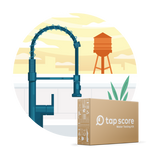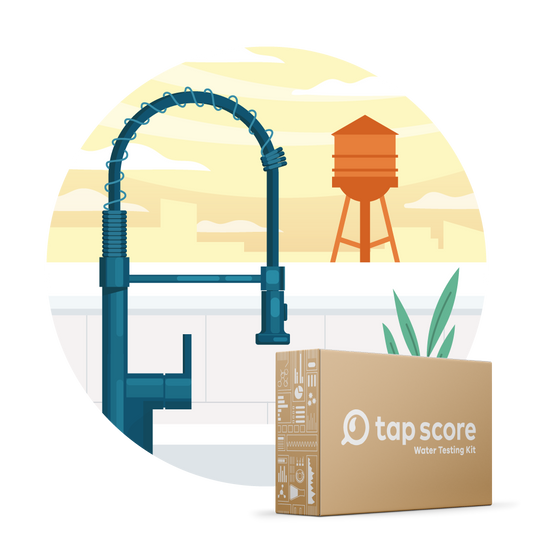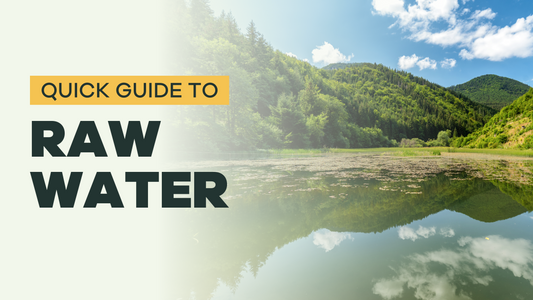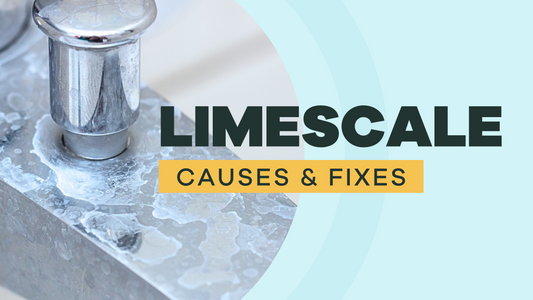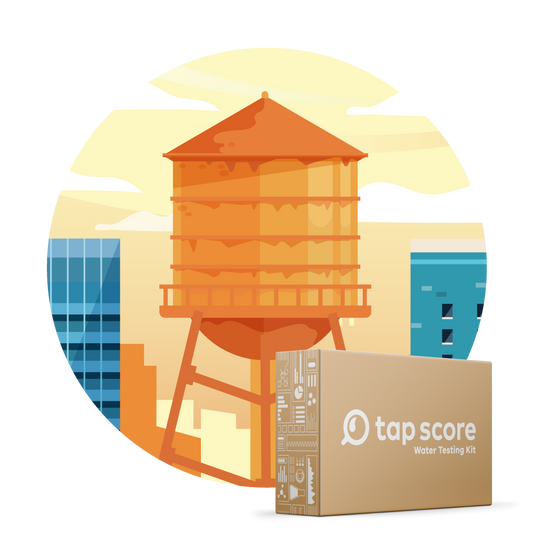
Why Is Water Quality Important in Baking?
Our blog is written by real experts— not AI. Each guide is carefully reviewed and updated based on the latest research. Plus, with no affiliate links, you can count on unbiased insights you can trust.
Many of us are turning to the comforts of baking at home while doing our part to flatten the curve during this global health crisis.
Working with our hands can help give us a sense of calm and control during times of uncertainty, and what’s more soothing than the scent of freshly baked bread? [1]
As both an art and a science, baking brings together seemingly simple ingredients through chemical reactions to create something new and delicious. Knowing a bit about your home water quality can help take your glutenous creations to the next level.
What Does Water Do During Baking?
At the core of baking, a successful loaf comes down to the interaction of flour, water, and yeast.
Water is behind all the natural chemical reactions that happen during baking and helps control your dough’s temperature and consistency. Just a few of water’s key roles include:
-
Hydrating the starch particles to begin the formation of dough
-
Dissolving and bringing together the other ingredients—like salt, sugar, and yeast
-
Reacting with the proteins in flour to become gluten
-
Controlling the rate of yeast fermentation
-
Triggering the Maillard reaction to form a glossy crust on your bread in the oven [2]
As your dough’s MVP, water quality can have an impact on your final product. Many of the important water quality factors boil down to mineral and chemical content.
SimpleLab’s Jess Goddard bakes weekly with filtered tap water, fresh milled flour from a nearby farm, and sourdough starter from Berkeley’s Cheeseboard Collective.
Does Hard Water Affect Baking?
Water hardness refers to the amount of calcium and magnesium in water—concentrations often measured in units of parts per million (PPM). These minerals act as “food” that nourish the yeast in your dough during fermentation. Mineral content can also have a strengthening effect on your dough’s gluten.[3]
Water hardness between 100 to 150 PPM is the sweet spot for bread baking.[4] Using a water softener can reduce water hardness.
-
If your water is too soft (10-50 PPM) it can limit fermentation, create dough that is sticky and loose, and result in poor texture in your final product.
-
If your water is too hard (>200 PPM) it can excessively speed up fermentation, limit the rise of your dough, and cause gluten to become too tough.
Is Alkaline Water Better for Baking?
Water’s mineral content is also related to its pH level and alkalinity. While calcium or magnesium comprise hardness, alkalinity measures your water’s ability to buffer changes in pH and is usually measured as the amount of calcium carbonate. Water is typically thought of as having a neutral pH (pH of 7), but we’ve seen household tap water pH range from 4.5 to 10. The more alkaline your water is, the more it may limit the natural acidity created during yeast fermentation.[4] This may cause the gluten in your dough to become unmanageably tough.
The ideal water pH for baking is slightly below 7.
Despite leading to suboptimal baking projects, alkaline water still manages to be one of the most popular drinking water trends. It’s been touted as “extra-healthy” and even “cancer-preventing.” Spoiler alert...it’s not. Read more in this article that blows the lid off of some of the most common myths surrounding the alkaline water trend: Alkaline Water: A Critical Review.
Can Water Quality Affect the Taste of Bread?
Sourdough starters may be sensitive to your water quality because it can alter the microbiome of helpful bacteria needed to leaven your dough.[5] Different bacteria favor different minerals (like magnesium, potassium, sodium, and sulfate), which can change the tanginess and other flavors being developed. None of this is likely to result in bad tasting bread–it just might taste differently. Experiments with instant yeast suggest that water quality may not have much impact on the taste of bread.[6] In both cases, there isn’t a big body of literature on tap water quality and baking, so more research is needed.
If your water at home has a noticeable odor, it’s worth testing your water to determine the source before using it for baking.
For example, water that smells like sulfur isn’t harmful to your health, but it might leave a strange taste in your cooking. A carbon filter or aerator can help resolve that issue.
If your water smells strongly of chlorine, it may not only give your baking a chemical taste, but can potentially sabotage the yeast and enzymes needed for a good rise.[7]
Can the Chlorine in Tap Water Kill Yeast?
Chlorine and related disinfectants are used during water treatment to remove harmful microorganisms, but chlorine can also kill useful bacteria needed for fermentation.
However, most potable tap water doesn’t contain enough chlorine to affect your baking when using store bought yeast. Tap water chlorine levels are typically below 4 PPM.[8] Only chlorine levels of 10 PPM or more are likely to affect yeast performance.
On the other hand, when making your own sourdough starter—using water to activate the wild yeast naturally found in flour—the longer fermentation time means more exposure to chemicals that may be in your tap water. If you’re having trouble making or maintaining your own starters, chlorine or chloramine may be the culprits.
Contact your local utility to find out which disinfectants they use during water treatment.
-
If your water contains chlorine, you can boil your water or let it sit in an open container for 24 hours [9]
-
If your water contains chloramine, you will need a water filter to remove it.
Can You Use Reverse Osmosis Water for Sourdough Starter?
Reverse osmosis (RO) is one of the most robust filtration systems for removing contaminants from water. But unless absolutely necessary to improve your water quality, some argue that it is wasteful and also removes too much of the mineral content of water needed to create a successful starter.
RO systems have post-treatment remineralization options if you are concerned that it may be affecting your baking. Some online bakers have also suggested adding mineral drops to your filtered water to help boost fermentation.[10]
Should I Test My Water to Improve My Baking?
The chemical, mineral, and microbiological content of most drinking water should not make or break your homemade confections. Indeed, most tap water quality will not have a negative impact on your break making ability. That said, knowing more about your tap water may help you optimize and troubleshoot any lingering baking issues that other solutions you’ve tried don’t seem to be fixing.
Tap Score’s Advanced City Water Test is a great baseline for assessing not only your water’s suitability for baking, but for general potability. Take a look at an example Tap Score Report here.
Advanced City Water Test
Ideal baseline for testing tap water provided by a local water utility–including metals, minerals, and chlorine-related byproducts.
Whether you are looking to ensure your water is safe for drinking or if you are striving to perfect your pumpernickel, the Tap Score team of chemists, water quality engineers, and treatment experts are always standing by to help out.

What Do We Do?
SimpleLab’s Chief Science Officer–Dr. Jess Goddard–has been a dedicated sourdough baker for years now. “We found trace lead in our tap water, so we use a basic pitcher filter certified to manage low levels of lead,” she said. “There is also a very strong chlorine smell to the water, so the filter reduces that.” Jess has yet to do an experiment on the flavor profile of her bread, but we will report back here when she does.
Read More
▾General Chemistry of Water – SimpleLab Tap Score
Do I Need a Water Softener? – SimpleLab Tap Score
How To Interpret Water Testing Units – SimpleLab Tap Score
Alkaline Water: A Critical Review – SimpleLab Tap Score
Sources and References
▾- What Survival Experts Say About Quarantine Baking
- Maillard Reaction
- The Effects of Hard Water and Soft Water on Baked Goods
- Water | King Arthur Baking
- Tap water is one of the drivers that establish and assembly the lactic acid bacterium biota during sourdough preparation | Scientific Reports
- Does Pure Water Make for Better Bread?
- Blog | Primo® Water and Water Dispensers
- Water Disinfection with Chlorine and Chloramine | Public Water Systems | Drinking Water | Healthy Water | CDC
- Super Easy Bread Recipe for Beginners
- Artistta: How to start your own sourdough starter.


